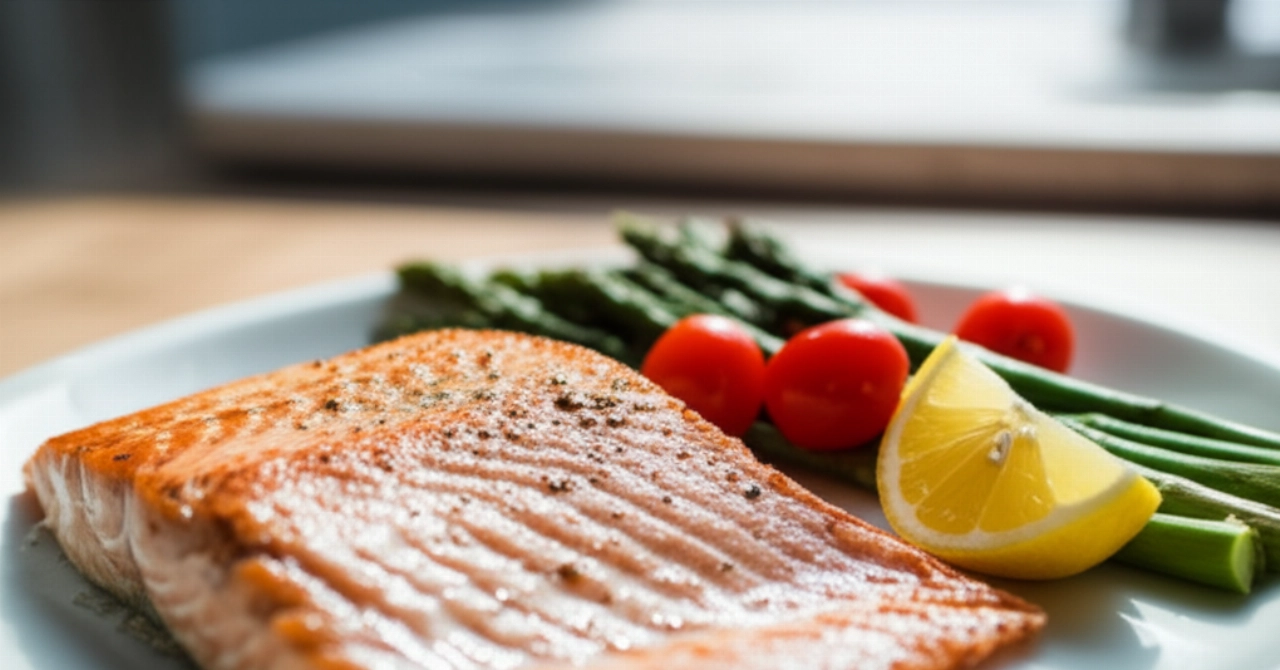Do you feel trapped in the endless cycle of diets that promise miracles and leave only frustration? Have you tried everything, but the weight always returns, bringing with it the feeling of failure and the fear of never succeeding again?
Perhaps you've heard of "intermittent fasting," but your mind is a whirlwind of questions: Is it another passing fad? Does it really work? Will I be hungry? Is it just for those who want to lose weight quickly, or is there more to it?
You're in the right place. We won't give you yet another list of rules or a generic plan. We'll guide you through the true benefits of intermittent fasting, supported by science, to show you how it can become your key to lasting well-being, without deprivation and without that annoying feeling of "being on a diet." This page is the map that will lead you to understand how to regain control of your body and your energy.

Beyond the Scale: How Intermittent Fasting Transforms Your Body and Your Daily Well-being
When you think of intermittent fasting, the first thing that probably comes to mind is weight loss. And it's true, it's one of its most well-known effects. But science reveals that its benefits go far beyond the numbers on the scale. It's a powerful strategy to optimize your metabolism and improve your health 360 degrees.
Here are the 7 incredible benefits of intermittent fasting that will make you look at food and your body with new eyes:
- Metabolism Acceleration and Fat Burning: During fasting, your body depletes its glucose reserves and begins to burn stored fat for energy. This process, called ketosis, is extremely effective for weight loss and reducing body fat, especially stubborn abdominal fat.
- Improved Insulin Sensitivity: Insulin is the hormone that manages blood sugar. Excessive production leads to fat accumulation and insulin resistance. Intermittent fasting helps stabilize sugar levels and improve cell sensitivity to insulin, reducing the risk of type 2 diabetes and facilitating weight loss.
- Promotion of Autophagy (Cellular Cleansing): This is a fascinating process! During fasting, your cells activate a "cleansing" and recycling mechanism, eliminating damaged components and regenerating healthy ones. It's like a deep reset for your body, fundamental for cellular health and longevity.
- Increased Energy and Mental Clarity: Many fear fatigue, but it's the opposite! With optimized fat metabolism and reduced glycemic fluctuations, you'll feel more stable energy and greater mental clarity. Goodbye to post-meal "brain fog"!
- Reduced Inflammation: Chronic inflammation is at the root of many modern diseases. Intermittent fasting has been shown to reduce inflammatory markers in the body, contributing to overall well-being and disease prevention.
- Support for Heart Health: By improving blood pressure, cholesterol levels, and triglycerides, intermittent fasting actively contributes to the health of your cardiovascular system.
- Life Simplification and Food Freedom: It's not just a physiological matter. Learning to manage fasting periods frees you from the slavery of having to eat every few hours, simplifies meal planning, and gives you back a more serene and conscious relationship with food.

Intermittent Fasting: Not Hunger, but Strategy. Key Principles for a Good Start
The fear of hunger is the first obstacle we encounter when talking about intermittent fasting. But the secret is not to suffer, but to understand how your body works and how to best nourish it during the "eating window."
Here are the key principles for approaching intermittent fasting effectively and sustainably:
- Choose Your Protocol: The most common is 16/8, where you fast for 16 hours and eat within an 8-hour window (e.g., from 12:00 PM to 8:00 PM). There are also 5:2 (eating normally for 5 days and drastically reducing calories for 2) or Eat-Stop-Eat (24-hour fast once or twice a week). The key is to find what fits your lifestyle.
- Hydration is Key: During the fasting period, water is your best friend. Drink plenty of water, unsweetened tea, black coffee. This helps manage hunger and keeps your body hydrated.
- Food Quality in the Eating Window: Intermittent fasting is not a license to eat anything. To maximize the **benefits of intermittent fasting** and weight loss, focus on whole, nutrient-rich foods: lean proteins, healthy fats, complex carbohydrates, and abundant vegetables. Think about macronutrient balance.
- Listen to Your Body: Initially, you might feel a bit hungry; that's normal. But learn to distinguish true hunger from "habit hunger." Over time, your body will adapt, and the feeling of hunger will decrease.
Remember, intermittent fasting is a tool, not a magic wand. Its effectiveness is amplified by a balanced diet and a healthy lifestyle.

The DIY Traps: Why Intermittent Fasting Requires a Scientific Approach
The web is full of information, but not all of it is accurate or suitable for you. Many people jump into intermittent fasting without guidance, making mistakes that can nullify results or, worse, compromise health. The DIY "miracle diet" is a trap that inevitably leads to failures and frustration.
Here are some common mistakes and why a professional approach is crucial:
- Excessive Calorie Restriction: Fasting doesn't mean starving. If you don't consume enough calories or nutrients during the eating window, you risk deficiencies, muscle mass loss, and a slowdown of your metabolism.
- Wrong Food Choices: Thinking "I can eat whatever I want" is a mistake. If you fill your eating window with ultra-processed foods and sugars, you nullify the benefits of intermittent fasting and won't achieve the desired results.
- Ignoring Individual Conditions: Intermittent fasting is not for everyone. Pregnant or breastfeeding women, people with a history of eating disorders, diabetics taking insulin, or those on specific medications should avoid it or practice it only under strict medical supervision.
- Lack of Sustainability: A non-personalized plan is difficult to maintain. If it doesn't fit your lifestyle, schedule, and preferences, you'll soon abandon it, falling back into the yo-yo effect.
Without expert guidance, you risk transforming a powerful wellness tool into another source of stress and disappointment. Your health is precious; don't leave it to chance.
Your Personalized Guide: Why Dietasnella.it is the Partner You're Looking For in Intermittent Fasting
You've understood that the benefits of intermittent fasting are real and profound. You've also realized that to make the most of them, a scientific, personalized, and sustainable approach is needed. And that's where Dietasnella.it comes in.
The difference between a generic diet and a tailor-made journey is immense. We don't give you a list of "yes foods" and "no foods." We offer you a partner who listens to you, understands you, and builds a plan with you that respects your uniqueness.
Our philosophy is based on:
- Scientific Personalization: Every plan is custom-made for you, taking into account your health status, lifestyle, food preferences, and goals. We integrate the principles of intermittent fasting only if and how it is most suitable for you.
- Sustainability and Taste: We believe that food should be a source of pleasure, not deprivation. We teach you to eat healthily and deliciously, with easy-to-prepare recipes and a balanced caloric intake that allows you to achieve your goals without suffering from hunger.
- Constant Support: You will never be alone. Our team of experts is by your side to answer your questions, motivate you, and adapt the journey if necessary.
- Nutritional Education: We don't just want you to lose weight, but to teach you how to maintain the results over time. You will gain the knowledge to make conscious food choices and manage your well-being independently.
Imagine no longer having to worry about what to eat, feeling energetic, confident in your body, and free from nutritional confusion. This is what we offer you.
Frequently Asked Questions about Intermittent Fasting
Is intermittent fasting suitable for everyone?
No, it's not suitable for everyone. While it offers many benefits, it is not recommended for pregnant or breastfeeding women, people with a history of eating disorders, diabetics taking insulin, or those suffering from chronic conditions. It is essential to consult a nutrition professional before starting to assess your suitability.
Will I feel hungry during fasting?
Initially, you might feel a bit hungry, especially if you're used to eating frequently. However, the body adapts quickly. Maintaining excellent hydration (water, unsweetened tea, black coffee) and consuming nutritious, balanced meals during the eating window helps manage hunger and makes you feel full.
What can I drink during the fasting period?
During the fasting period, you can drink plain water, sparkling water, unsweetened tea (green, black, herbal teas), black coffee (without sugar, milk, or cream). These beverages do not break the fast and help you stay hydrated.
How long does it take to see results with intermittent fasting?
Timelines vary from person to person, based on the starting point, chosen protocol, and the quality of nutrition within the eating window. Some notice improvements in energy and mental clarity after just a few days. For weight loss, results may start to be visible after 2-4 weeks of consistent and correct adherence.
Can I exercise while practicing intermittent fasting?
Yes, it is possible and often recommended. Many find that exercising while fasted (especially in the morning) increases energy and focus. It's important to listen to your body and, if necessary, adjust workout intensity or meal timing. Always ensure you hydrate adequately.
Your Journey to Well-being Starts Here
You've discovered that intermittent fasting is not a deprivation, but a powerful strategy to regain control of your well-being, your energy, and your relationship with food. It's not just about weight, but about vitality and confidence.
Perhaps you're thinking: "It sounds great, but will it be too complicated for me?" Or "What if I fail again, like with other diets?" The truth is that every body is unique, and a "one-size-fits-all" approach is a recipe for frustration. Your story, your needs, your goals deserve personalized attention.
Stop feeling frustrated and confused. Your body deserves a clear path that leads to real and lasting results. The first step isn't a restrictive diet, but understanding your needs to create a tailor-made plan for you. It's free, no obligation, and will give you the map to reach your goal. Click here, tell us about yourself, and discover how you can finally reach your ideal weight feeling great. Start transforming your relationship with food now.





